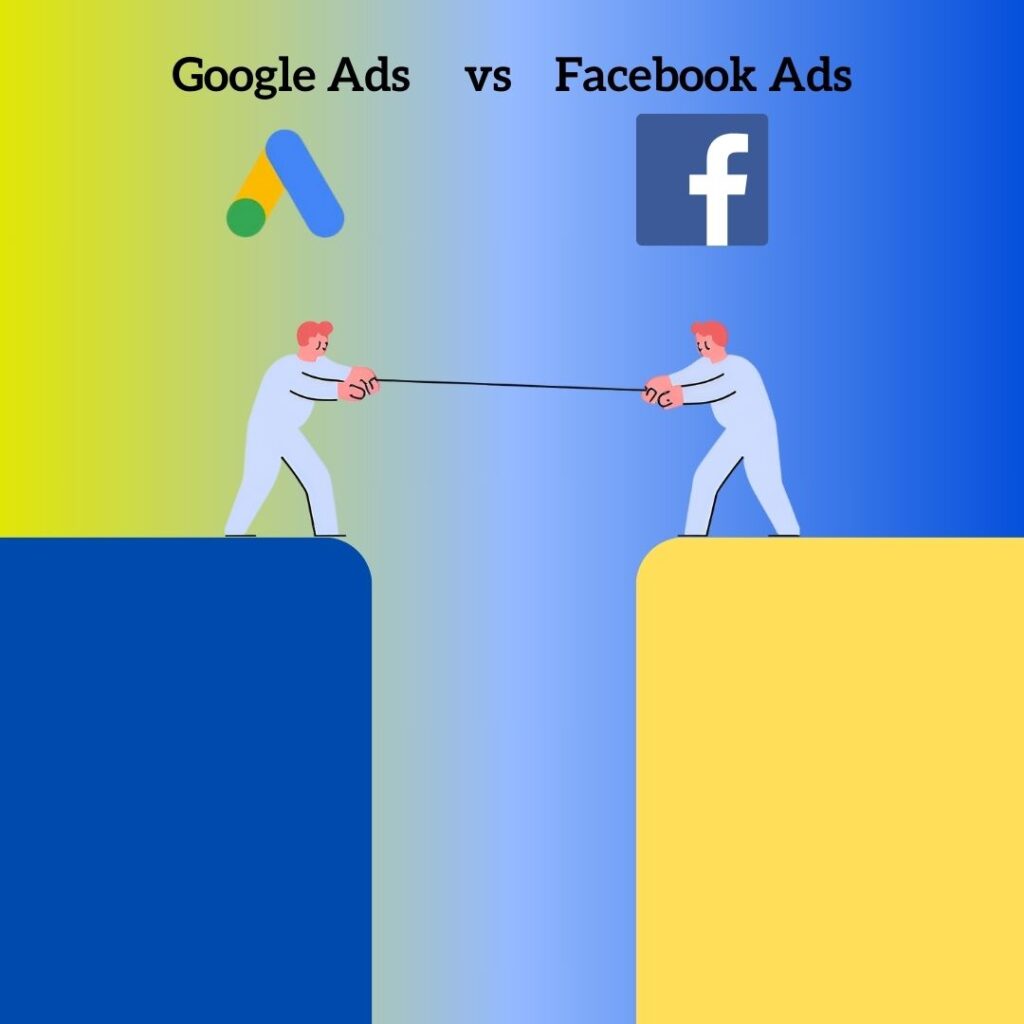Google Ads v/s Facebook Ads
![]()
Introduction of Google Ads v/s Facebook Ads
- Understanding the importance of online advertising
- Brief overview of Google Ads and Facebook Ads
Target Audience Analysis
- Identifying the target audience for each platform
- Tailoring ads based on audience demographics
Cost and Budget Considerations
- Comparing the cost structure of Google Ads and Facebook Ads
- Setting a budget that aligns with advertising goals
Ad Formats and Placement
- Exploring the various ad formats offered by Google Ads and Facebook Ads
- Understanding where ads are displayed on each platform
Reach and Visibility
- Analyzing the reach and visibility potential of Google Ads and Facebook Ads
- Leveraging targeting options to maximize ad exposure
Tracking and Analytics
- Evaluating the tracking and analytics tools provided by both platforms
- Utilizing data to optimize ad performance and ROI
Campaign Objectives and Goals
- Defining campaign objectives and goals for Google Ads and Facebook Ads
- Choosing the right platform based on advertising objectives
Remarketing and Retargeting Strategies
- Implementing remarketing and retargeting strategies on Google Ads and Facebook Ads
- Engaging with users who have previously interacted with the brand
Ad Performance and Conversion Rates
- Monitoring ad performance metrics such as click-through rates and conversion rates
- Optimizing ads for better performance and higher conversion rates
Ad Transparency and Privacy
- Addressing concerns regarding ad transparency and user privacy on both platforms
- Ensuring compliance with privacy regulations and policies
Customer Engagement and Interaction
- Encouraging customer engagement and interaction through ads on Google and Facebook
- Building brand loyalty and trust with targeted messaging
Case Studies and Success Stories
- Sharing case studies and success stories of brands using Google Ads and Facebook Ads effectively
- Drawing insights and lessons from real-world examples
Emerging Trends and Future Prospects
- Discussing emerging trends in online advertising and the future prospects of Google Ads and Facebook Ads
- Anticipating changes and adapting strategies accordingly
Conclusion
In conclusion, the debate between Google Ads and Facebook Ads ultimately comes down to the specific goals and objectives of your advertising campaigns. Both platforms offer unique advantages and cater to different audience segments. By understanding your target audience, defining clear campaign objectives, and leveraging the strengths of each platform, you can create successful advertising campaigns that drive results.
FAQs
1. Which platform is more cost-effective, Google Ads or Facebook Ads?
- The cost-effectiveness of each platform depends on various factors such as your target audience, industry, and advertising goals. It’s essential to analyze the cost structure and performance metrics of both platforms to determine which one offers the best value for your investment.
2. Can I run ads simultaneously on both Google and Facebook?
- Yes, you can run ads simultaneously on both platforms to reach a broader audience and diversify your advertising strategy. However, it’s essential to tailor your ads according to the unique features and audience demographics of each platform for optimal results.
3. How can I measure the success of my advertising campaigns on Google Ads and Facebook Ads?
- You can measure the success of your advertising campaigns on both platforms by tracking key performance indicators such as click-through rates, conversion rates, and return on investment. Utilize the analytics tools provided by Google Ads and Facebook Ads to gather insights and optimize your campaigns accordingly.
4. Are there any privacy concerns associated with advertising on Google and Facebook?
- Both Google and Facebook have robust privacy policies in place to protect user data and ensure compliance with privacy regulations. However, it’s essential to be transparent with users about how their data is being used for advertising purposes and provide options for opting out of targeted ads if desired.
5. What are some best practices for creating effective ads on Google Ads and Facebook Ads?
- Some best practices for creating effective ads include defining clear campaign objectives, targeting the right audience segments, using compelling visuals and messaging, and continuously optimizing ad performance based on analytics data.

